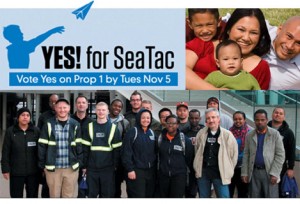OPINION
SeaTac Prop 1 win is a model for workers across the country
UPDATE (Nov. 10, 2013) — As late ballots have continued to be counted, SeaTac Proposition 1 is now leading by a mere 43 votes. King County election results show SeaTac Proposition 1 yes votes leading with 50.56% at 2,544 to no votes at 49.44% and 2,501 votes. A recount is possible, so we may not know the outcome for several more days.
The following was posted the day after election day, when Prop. 1 had a 9 percentage-point lead.
 By REBECCA SMITH
By REBECCA SMITH
(Nov. 6, 2013) — Some say the growing income and wealth gap in America is an unchangeable fact of life. Voters in the tiny city of SeaTac, Wash. (pop. 27,000) — home to the Seattle-Tacoma International Airport — think otherwise. On Election Day, SeaTac voters appear to have approved Proposition 1, which raises the minimum wage to $15 an hour for travel-related industries in the airport and in the city. Passage of the ordinance is a strike against inequality for this small municipality. But it is also a model for workers and communities throughout the country.
The community of SeaTac is a microcosm of the country the United States is becoming. In the shadow of a highly profitable airport, 31% of SeaTac’s children live in poverty. Major corporations pay minimal wages to their workers. Baggage handlers, jet fuelers, and cabin cleaners rely on food stamps to make ends meet.
 The campaign for Proposition 1 took on that low-wage, no-benefit formula. Ethiopian, Filipino and Somali community groups joined with business, labor, and faith groups to pass the measure. Now, more than 6,000 workers will get a raise. Workers will be able to keep the tips they earn. Many will gain access to full-time jobs. Moms and dads will be able to stay home, with pay, when their kids get sick.
The campaign for Proposition 1 took on that low-wage, no-benefit formula. Ethiopian, Filipino and Somali community groups joined with business, labor, and faith groups to pass the measure. Now, more than 6,000 workers will get a raise. Workers will be able to keep the tips they earn. Many will gain access to full-time jobs. Moms and dads will be able to stay home, with pay, when their kids get sick.
More money in the family bank account means SeaTac businesses will also benefit. A recent study estimates that higher wages will generate $54 million in economic activity and create 400 new jobs. Businesses will see a more productive, stable workforce.
Modest SeaTac may seem like an unlikely testing ground for social change. But Prop. 1 passed because SeaTac voters, like those around the country, see minimum wage as a simple question. Ballot initiatives to raise the minimum wage nearly always succeed (and nearly always by healthy margins), despite vehement opposition by powerful business groups. In fact, on Nov. 5, New Jersey voters also approved an increase in the state minimum wage. In the case of Prop. 1, Alaska Airlines and the Washington Restaurant Association sued to prevent voters from having a voice. But in the end, Prop. 1 went to the people, and the people said yes.
In these difficult economic times, ordinary people have an even deeper understanding of the simple truth that work – and workers – should be valued. They read daily newspaper reports of skyrocketing profits, but don’t see increases in their paychecks. And they are beginning to demand a different bargain, as they have just done in SeaTac.
In the last century, union organizing built a thriving middle class in our country. In this century, legal and practical hurdles, a globalized supply chain and practices like subcontracting and franchising place many beyond the reach of traditional labor law. So workers and their communities are finding other ways to win improvements in wages and working conditions, from one day strikes by warehouse workers and port truck drivers to new alternative worker organizations like OUR Walmart and workers’ centers.
With Congress in permanent gridlock, workers around the country are increasingly taking their case to voters and local policymakers. In New York, California, and Hawaii, domestic workers and their allies have gained passage of laws that finally recognize this work as real work. SeaTac joins eight other jurisdictions that have approved paid sick day legislation. This summer’s fast food strikes – calling for a $15 minimum wage and the right to organize – focused the nation’s attention on millions of workers who can’t survive, much less raise a family, on the meager wages paid in their industry.
The idea of strong minimum wages is catching fire at the state and city level. Both Seattle mayoral candidates have endorsed a $15 minimum wage. Washington, D.C. is contemplating a substantial increase in its minimum wage. Higher airport minimum wages are already the rule in major airports across the country and in cities like Santa Fe, San Francisco and San Jose.
Prop. 1 takes a step toward rebuilding an economy where every family, as well as the businesses they patronize, has a chance to prosper. A small town may have just found a way to help solve one of America’s biggest problems.
Rebecca Smith is deputy director of the National Employment Law Project. The column, which also appears today at MSNBC.com, is posted here with the author’s permission.





